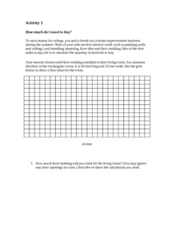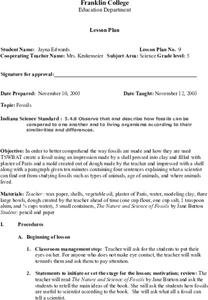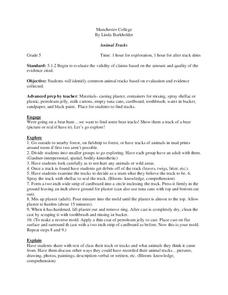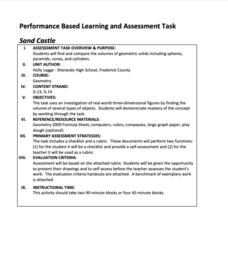Curated OER
Industrial Processes of Polymers: How toys Are Made
Students explore how technology and science have created the plastics that make toys. In this industrial processes lesson students work on their own injected molded product and a blow molded product.
Curated OER
How Much Do I Need to Buy?
In this perimeter worksheet, learners solve five problems in which they calculate how much floor molding they need to buy for a living room. Students use the provided grid to draw the plan.
Curated OER
Earth's History
Sixth graders investigate how fossils are formed. They analyze a photo of the Grand Canyon, and create a fossil cast and mold using plaster of paris and shells.
Curated OER
Do-It-Yourself Fossils
In this fossils worksheet, students create their own casts, molds, imprints, and embedded fossils. Then students complete a fossil comparison chart. This worksheet has 12 fill in the blank questions.
Curated OER
Sand and Water
Students follow this recipe for fun clay creations. In this early childhood art and science lesson, students develop creative-thinking skills, fine-motor skills, and sensory awareness while they make, mold, and decorate salt dough.
Curated OER
Integrating Biology-Serendipity and Science
In this science and serendipity worksheet, students read about how Fleming discovered Penicillin by accident when observing bacteria that didn't grow where mold existed. Students answer questions about scientific discoveries.
Curated OER
Fossils
Fifth graders create a fossil using an impression made with a shell pressed into clay and filled with plaster of Paris and a mold made out of dough and impressed with a shell. They also will receive a paragraph which contains four...
Curated OER
Feet Are Neat
Students describe several types of bird feet and explain how each type helps a bird survive in its habitat. Students then match birds to their feet and mold bird feet out of clay.
Curated OER
Are Nanobacteria Alive: Sample Socratic Questions
Students comprehend the definition and uniqueness of life and its complexities. They examine what characteristics constitute a living organism. Students recognize the extent of the role nanobacteria play in the movement and molding of...
Curated OER
Rotting Food
Students put bread out on a plate for a few days and put it under a microscope when it begins to mold. In this rotting food lesson plan, students discuss eating old food and what it does to your body.
Curated OER
Animal Tracks
Sixth graders practice using logic and scientific proof while examining animal tracks. In this scientific method instructional activity, 6th graders identify different animals and the type of tracks they leave behind by observing...
Curated OER
Sculptural Heads
Students create sculptures of a human head with Sculptamold. They discover the differences between two and three dimensional art. They combine art history, aestetics and personal expression to create a sculpture.
University of Hawaiʻi
Taxonomy and Me!
Taxonomy is the study of organisms and how you phylum. Three biology activities are included, helping scholars understand four of the six kingdoms, specifically Protista, Plantae, Fungi, and Animalia. Scholars observe and classify...
Radford University
Sand Castle
Don't let the task slip through your fingers like sand. Scholars design sand castles using hemispheres, pyramids, cones, and cylinders of different sizes. They calculate the volume and surface area and consider how changing the...
Curated OER
he History and Aesthetics of African Jewelry
Students study the jewelry from various groups from Africa. They identify and discuss the region Equatoria and the Yoruba and people from Benin and review the jewelry from this region. They make and pour a plaster of paris mold and...
Curated OER
A Dash of Folk, A Pinch of Fairy Recipes for Playmaking
Students examine the importance of oral traditions while reading various fairy and folk tales. Given a piece of clay, they can mold it into any shape they want and pass it to their neighbor which keeps building the object. They use...
Curated OER
Clay Hill Animal Sampling
Students create animal print casts from molds in the classroom. They use the cast patterns to identify animal prints on a field trip in which they locate animal tracks, identify the location with GPS and create field casts of the...
Curated OER
Science Processes
Fifth graders observe a dry piece of bread and a damp piece of bread in two separate sealed bags that have been sitting for several days that have been labeled. The observe the mold with a hand lens and record findings in their science...
Curated OER
Kitchen Garbage: Food For Thought
In this fungi and food matching instructional activity, students draw lines to match different types of fungi such as yeast and mold, and with the foods that they affect.
Curated OER
What is a Fossil?
In this fossil worksheet, students are given twelve terms to find in a word search that are related to the types of fossils and the study of fossils.
Curated OER
The Incredible, Edible Cell
Students discover organelles and the functions organelles perform in cells. For this biology lesson, students create model cells using Jell-o, then dissect their "cell" to examine the parts that create a cell. Students create a diagram...
Curated OER
Animal Habitats
Students explore animal lifestyles by researching their characteristics. For this animal habitat lesson, students read the story Over in the Jungle and analyze the animal illustrations in the book. Students create clay animal characters...
Curated OER
Color It Recycled!
Students melt old crayon stubs and mold them into interesting shapes and characters. They can add paper clips to created hanging ornaments!
Curated OER
More than Masks
Students design their own mask using the face as the base. Using pieces of acetate, they mold the material into the shape of their face and turning it into an animal. They must draw their design and calculate the measurements before...
Other popular searches
- Cast and Mold Fossils
- Bread Mold Experiment
- Bread Mold
- Moldy Bread Experiment
- Fungi and Mold
- Mold on Bread
- Mold Making
- Moldova
- Clay Molds
- Yeast Mold
- Fungus and Mold
- Fossil Molds























